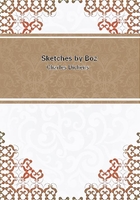
第39章
clerks who were making a search for some legal purpose, with the air of earnestness and interest which distinguished the strangers to the place, who were looking up the will of some deceased relative; the former pausing every now and then with an impatient yawn, or raising their heads to look at the people who passed up and down the room; the latter stooping over the book, and running down column after column of names in the deepest abstraction.
There was one little dirty-faced man in a blue apron, who after a whole morning's search, extending some fifty years back, had just found the will to which he wished to refer, which one of the officials was reading to him in a low hurried voice from a thick vellum book with large clasps. It was perfectly evident that the more the clerk read, the less the man with the blue apron understood about the matter. When the volume was first brought down, he took off his hat, smoothed down his hair, smiled with great self-satisfaction, and looked up in the reader's face with the air of a man who had made up his mind to recollect every word he heard. The first two or three lines were intelligible enough;but then the technicalities began, and the little man began to look rather dubious. Then came a whole string of complicated trusts, and he was regularly at sea. As the reader proceeded, it was quite apparent that it was a hopeless case, and the little man, with his mouth open and his eyes fixed upon his face, looked on with an expression of bewilderment and perplexity irresistibly ludicrous.
A little further on, a hard-featured old man with a deeply-wrinkled face, was intently perusing a lengthy will with the aid of a pair of horn spectacles: occasionally pausing from his task, and slily noting down some brief memorandum of the bequests contained in it.
Every wrinkle about his toothless mouth, and sharp keen eyes, told of avarice and cunning. His clothes were nearly threadbare, but it was easy to see that he wore them from choice and not from necessity; all his looks and gestures down to the very small pinches of snuff which he every now and then took from a little tin canister, told of wealth, and penury, and avarice.
As he leisurely closed the register, put up his spectacles, and folded his scraps of paper in a large leathern pocket-book, we thought what a nice hard bargain he was driving with some poverty-stricken legatee, who, tired of waiting year after year, until some life-interest should fall in, was selling his chance, just as it began to grow most valuable, for a twelfth part of its worth. It was a good speculation - a very safe one. The old man stowed his pocket-book carefully in the breast of his great-coat, and hobbled away with a leer of triumph. That will had made him ten years younger at the lowest computation.
Having commenced our observations, we should certainly have extended them to another dozen of people at least, had not a sudden shutting up and putting away of the worm-eaten old books, warned us that the time for closing the office had arrived; and thus deprived us of a pleasure, and spared our readers an infliction.
We naturally fell into a train of reflection as we walked homewards, upon the curious old records of likings and dislikings;of jealousies and revenges; of affection defying the power of death, and hatred pursued beyond the grave, which these depositories contain; silent but striking tokens, some of them, of excellence of heart, and nobleness of soul; melancholy examples, others, of the worst passions of human nature. How many men as they lay speechless and helpless on the bed of death, would have given worlds but for the strength and power to blot out the silent evidence of animosity and bitterness, which now stands registered against them in Doctors' Commons!